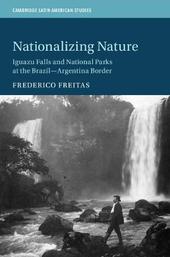
|
Nationalizing Nature: Iguazu Falls and National Parks at the Brazil-Argentina Border
Paperback / softback
Main Details
Description
Today, one-quarter of all the land in Latin America is set apart for nature protection. In Nationalizing Nature, Frederico Freitas uncovers the crucial role played by conservation in the region's territorial development by exploring how Brazil and Argentina used national parks to nationalize borderlands. In the 1930s, Brazil and Argentina created some of their first national parks around the massive Iguazu Falls, shared by the two countries. The parks were designed as tools to attract migrants from their densely populated Atlantic seaboards to a sparsely inhabited borderland. In the 1970s, a change in paradigm led the military regimes in Brazil and Argentina to violently evict settlers from their national parks, highlighting the complicated relationship between authoritarianism and conservation in the Southern Cone. By tracking almost one hundred years of national park history in Latin America's largest countries, Nationalizing Nature shows how conservation policy promoted national programs of frontier development and border control.
Author Biography
Frederico Freitas is an Assistant Professor of Digital and Latin American History and a core member of the Visual Narrative Initiative at North Carolina State University. He is the co-editor of Big Water: The Making of the Borderlands Between Brazil, Argentina, and Paraguay (with Jacob Blanc, 2018) and a recipient of an NEH fellowship.
Reviews'Frederico Freitas's illuminating study of the conjoined origins of the National Parks of Iguazu/Iguacu on the Argentine-Brazilian border reveals the intricate geopolitical histories behind one of the world's most famous conservation sites. Through comprehensive binational research, Freitas deftly reconstructs the evolution of the preserves as built environments born of power-laden struggles over natural landscapes and international boundaries. An outstanding contribution to the fields of Latin American environmental history and comparative borderlands.' Seth Garfield, Professor of History, University of Texas, Austin 'This superb book combines skilled storytelling and incisive analysis to explain the histories of adjoining national parks on a borderland. Freitas tracks the parks' transformations through the spatial practices of a wide range of actors, from policymakers to heart-of-palm thieves, and he makes exemplary use of the analytical power of mapping.' Thomas D. Rogers, Arthur Blank/NEH Chair in the Humanities and Humanistic Social Sciences and Associate Professor of History, Emory University 'With this captivating book, Freitas demonstrates how conservation in boundary areas reveals the dynamic geopolitics of nature protection. Far from a story of neutral biodiversity conservation, Freitas' analysis exposes the comparative social and political processes with essential lessons for every conservation organization - especially government agencies.' Emily Wakild, Professor of History and Director of Environmental Studies, Boise State University '... an innovative and enjoyable read. It poses new questions - and answers them through new methods - relating to the environment, borders, and the territorial projects that shape nation-states.' Jacob Blanc, Hispanic American Historical Review
|